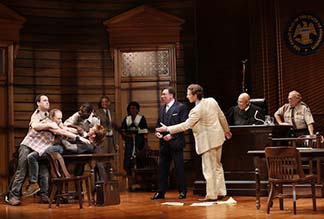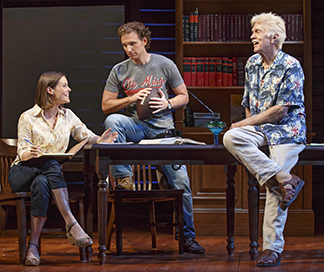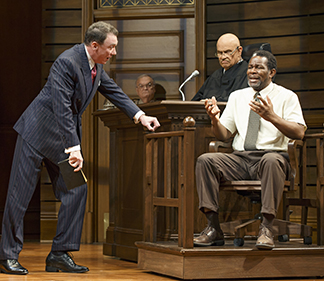By Lucy Komisar This is a play for which the word “riveting” was invented. It’s got action, history and ideas, stimulating on all accounts. It‘s the early 1980s in Mississippi. Two low-life whites, whose prime amusements are drink and drugs, have raped a 10-year-old black girl they came upon carrying groceries on a lonely rural road. They leave her for dead. But in the hospital, she identifies them, and they are arrested. John Grisham graduated from the University of Mississippi Law School in 1983 and practiced criminal law as a trial lawyer for about a decade. The play is based on his 1989 novel, inspired when he was at a courthouse where a 12-year-old told a jury how she had been beaten and raped. Members of the jury had cried when the girl told her story, and Grisham anchored this play on the lawyer‘s emotional appeal to the hearts of the jurors that hear the case. (Grisham, on the board of The Innocence Project, is an admirable Mississippian with a lot of heart.)

The taut, sensitive adaptation is by Rupert Holmes, a mystery novelist and playwright whose mystery musicals “Curtains” and “The Mystery of Edwin Drood,” have deservedly won a slew of awards. Director Ethan McSweeny‘s staging is cool and passionate. There‘s no contradiction. The play takes place in the fictional town of Clanton, Mississippi. The child‘s father, Carl Lee Hailey, is portrayed by John Douglas Thompson, a brilliant Shakespearean actor, who grips you with every sound and look. The good-guy lawyer is local boy Jake Brigance (Sebastian Arcelus). The set is a courtroom of cherry wood, doors with pediments and three turning ceiling fans. (The designer is James Noone.) The mood is established with Southern country music. Hailey is present for the attackers‘ arraignment at which one confesses in a lurid, horrific detail what they did. Lee Sellars as Billy Ray Cob and Dashiell Eaves as Pete Willard are very good as the ne‘er do wells, one with a gray pony tail, the other unkempt and unshaven. Types, yes, but true to type. Why not let justice take its course? Brigance, who has watched the arraignment in the court room, inquires what whites raping a black person would get. “Maybe nine years.”

If that‘s the law, Hailey will make his own. But before he does the deed, he gets Brigance‘s commitment to represent him. (Brigance had represented his brother.) Rather unusual, but it works. Then he carries a Vietnam era M16 assault rifle to the courthouse and kills the attackers. Brigance takes the case despite little money from his client and some big threats, including the Klan burning crosses, a caller threatening his young daughter, a guy caught at his house with a suitcase bomb, and worse. The other major character is District Attorney Rufus Buckley (Patrick Page), a self-promoting blowhard with a raw staccato voice, who wants to be governor. Grisham knew about this type, as he served from 1983 to 1990 in the Mississippi House of Representatives. Just in case we need to know more about Buckley, he slaps a pretty law student intern, Ellen Roark (Ashley Williams), on the fanny as she walks past him. Ellen worked for the ACLU and now wants to be a radical defense attorney working to abolish the death penalty. She switches sides and signs up to help Brigance. Williams is smart and good, though a bit too much television. But she‘s great with a Southern accent put on to appeal to the judge. Talking about real life and justice, another character in the play is the judge, Omar Noose. An odd name for a judge, it has to be Grisham‘s joke. The actor, Fred Dalton Thompson, who handles the role with aplomb, was a real-life judge of sorts when he sat as U.S. senator from Tennessee at the Watergate hearings.

Lucian Wilbanks (the terrific Tom Skerritt) is Brigance‘s father-in-law, a lawyer disbarred because of problems related to drink. He is also not averse to paying off jurors. The local sheriff Ozzie Walls (Chike Johnson) is black. This is a bit hard to believe since Ford County is said to be “whiter than an albino mouse in a snowstorm.” The defense argument is temporary insanity. There are projections of the leafy countryside where the rape occurred. Brigance uses the Bible and calls for sentiment in the cause of justice. He plays to the jury that “nobody ordered you to check your heart at the courthouse door.” Grisham/Holmes nails Buckley with his comment about “the law of the jungle,” a racist allusion. You can see lawyer Grisham pleading the case. “A Time to Kill.” Based on the novel by John Grisham, adapted by Rupert Holmes. Directed by Ethan McSweeny. Golden Theatre, 252 West 45th Street, New York City. 212-239-6200. Opened Oct 20, 2013, closes Nov 17, 2013. 10/26/13.

